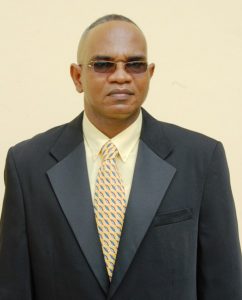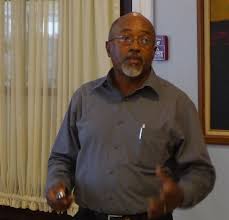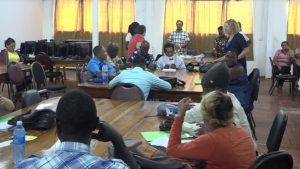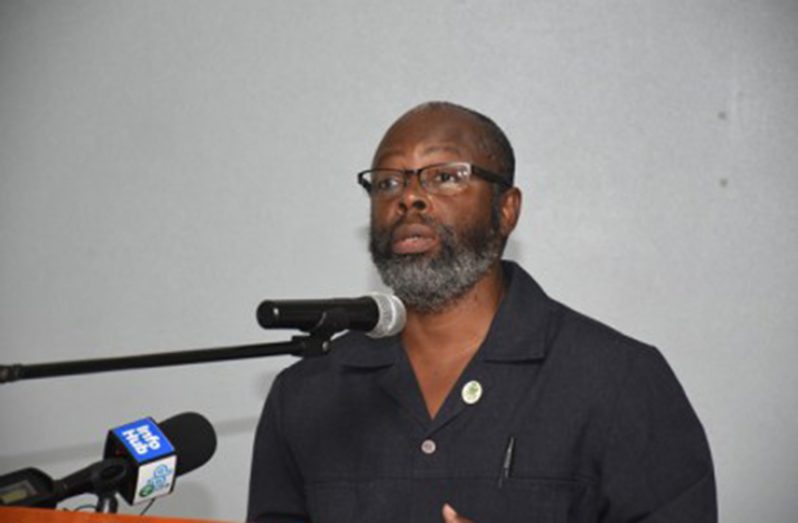Improving the coconut farming industry one step at a time
THE EUROPEAN Union and the African, Caribbean and Pacific Group of States (EU-ACP)-funded Coconut Industry Development for the Caribbean (CIDC) Project has recently entered its last of a series of training programmes in the Guyana segment. This project is being executed by the International Trade Centre (ITC) in collaboration with the Caribbean Agricultural Research and Development Institute (CARDI).
It is intended that at the completion of this series of programmes, there will be the establishment of Coconut Nurseries and Demonstration Plots for inter-cropping of coconuts.
The training programme, which was titled ‘Value Addition and Food Safety in Coconuts’ was conducted by the Guyana School of Agriculture (GSA) at its Agro-Processing facility in Mon Repos. And according to ITC Coordinator, Raymond Trotz, the GSA was the first institution to sign on as a partner with the ITC and CARDI to execute the programme in Guyana.
He explained that the Alliance for Action, which consists of not just the farmers and processors, but also institutions such as CARDI and National Agricultural Research and Extension Institute (NAREI), the Guyana Marketing Corporation (GMC), IPED, GSA and the Small Business Bureau. These institutions, he said, have all been assisting in the training of participants over the last few months.

Participants were farmers and processors, who were drawn from the three pilot zones of the Project, namely: Region Two, Regions Four and Region Five, as well as Region 10. They were exposed to learning in ways of developing key products from both water-nuts and dry coconuts, as well as other products of their choice.
The programme ran from August 13-17, 2018 and at the end of it, there were displays of the various products, as well as the handing over of certificates to the participants.
FIRST OF ITS KIND IN GUYANA
Chief Executive Officer of the Guyana School of Agriculture (GSA), Brian Greenidge in his remarks told the gathering that the GSA felt very honoured to be partnering with ITC, CARDI, NAREI, GMC, the national stakeholder platform in coconuts in having the programme run off. He said that this type of training programme was the first of its kind in Guyana and posited that the participants were bound to benefit from the programme after all that was put into making it a result-oriented project.
He noted that since most of the participants are coming from coconut plantations, while many already have their own value-added operations the training programme could only put them in good stead to move their businesses forward.
“I am a proponent of knowledge being shared and I only wish to task each and every one of you that when you go back to your various communities or workplace you are from, that you try to share the knowledge that you have gained with them so that we can all develop,” he said. “Some people believe or feel that if you lock it off it can only benefit them – that’s good, but that is not where we want to go. If you do not share it we as a people would not be able to move forward. Yes, one person may do well, but all the others may suffer.”
SHARE THE KNOWLEDGE
Greenidge said that he was, therefore, urging all the participants to go back to their communities; their workplaces or wherever they represent and share the knowledge they gained over the days they spent in training.
He said that the built-in the programme is a feedback mechanism, in which the GSA would seek to find out how participants are using the knowledge gained.
“Participants have gone through a lot of practical sessions, where they now know about food quality, food hygiene and handling food, food sanitation, product development and were also introduced to food processing,” he said, which they can now apply to their businesses, adding further value to their products.
STIMULATING THE INDUSTRY

CARDI Representative in Guyana, Dr. Cyril Roberts told the gathering that the project is a venture embarked on to resuscitate and re-invigorate the coconut industry and that it starts out with the plant materials. He said that the market is expanded for the demand of the coconut products and there is going to be the need for our estates and coconut plantations to be as productive as possible. In the coming week, he said, the programme will be establishing more formal nurseries in the most scientifically sound way, calling on all the entities that can be found in the country.
“Productivity of our plantations is another crucial aspect of what the programme is going to be looking at and this is going to be done by starting new plants, by choosing selected farms in strategic areas,” Dr. Roberts said. “We want you to make money and so while you (the farmers) wait for the coconut trees to come on we are going to be encouraging intercrops. As we listen to you and how you feel, we are going to encourage you to diversify your crops in that manner.”
He noted that CARDI and all the other agencies involved in the training of farmers will consider it a success if they can look on the landscape and observe the economic success of success as they use some of what they were able to learn at the sessions.
He further stated that part of what is done in the project is a marketing aspect because it is considered very critical and farmers are able to sell what they produce would be one of the undertakings that CARDI and the other institutions would be happy to partner with farmers on, he said.
FINAL PHASE

Dr. Roberts said that the project will conclude by the end of the year but it will continue at another level next year and marketing will be a major aspect of it, among other planned programmes.
Trotz noted that the next phase of the project will be the establishment of coconut nurseries and demonstration plots, which consist of coconut intercropping from a variety of selected crops. Additionally, he mentioned that there will be demonstration plots, which will be set up for the farms and lead farmers in a rigorous way in Regions Two, Four, Five and 10.
“We are in the process now, myself and Dr. Roberts, of finalising plans to go into the fields to select mother palms and seed nuts to generate the seedlings from those seed nuts for growth, on not only the lead farmers’ plots but also others farms,” he said. This, he informed the gathering, is the beginning of germplasm regeneration in Guyana.(mercilinburke2017@gmail.com)



.jpg)









